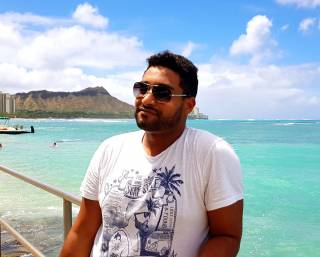Japheth completed his PhD in planetary atmosphere with Prof. Nick Achilleos and was a recipient of the prompt submission bonus.

What was your PhD experience like at UCL?
Honestly, it was the best!!! The work was obviously hard but that kind of comes with the territory. I think that as long as you work on something that you enjoy, you will be fine regardless of how hard it may seem at times. I also benefited from a great and supportive supervisor who stressed the importance of work-life balance to me from day one, was always there when I needed him, and was happy to let me intellectually “roam free” and guide my own work particularly after the first year. Apart from having the right academic support system for my studies, I also had amazing peers in the Astrophysics group. The few years that I was studying for my PhD, we had this critical mass of like-minded students and Postdocs that made our time together, working hard and playing even harder, one of the most memorable times of my life so far. The amazing thing is that we are all still close friends even after the best part of a decade!
That being said, no place is perfect and I have peers whose experience differs quite starkly from my own. It totally depends on what your support networks, academic and social, are like. Both of mine were great but this wasn’t the case for everyone.
Please describe (what was) your research area.
My research was in the field of planetary astrophysics or space physics. It focused on studying the interaction between the solar wind and gas giant planets; their surrounding magnetic field and upper atmosphere using computational models and spacecraft observations.
Describe the Astrophysics group in three words?
Friendly, successful and quirky.
Your most memorable moment whilst doing your PhD?
Hmm… I actually don’t think I can answer this without a drink or two ;)
Where are you working now?
Arrival, a London-based electric vehicle startup.
What attracted you to the job?
Arrival is all about radical impact and the creation of clean cities. Being a part of a company that’s creating green and sustainable solutions for transport and commercial vehicles in cities is a cause that’s close to my heart. It’s simple really, I want to work for companies that are trying to make positive changes in the way we go about our lives and Arrival is one of them.
How has your Astrophysics PhD helped you in your line of work?
I’d be lying if I said that Astrophysics directly helps in my line of work but the skills that I learned during my PhD definitely help. I’m a computational engineer and our job role isn’t very well defined. I do a range of different things such as analysing data, developing and running various models and simulations, and software engineering. These quantitative skills and the soft skills I used to present my work were honed during my time in academia and I was lucky to have supervisors and mentors with strong software engineering skills so I learned a lot from them on this aspect too.
What do you aim to be doing in 5 years time?
The great thing about not being in academia is that 5 years is a REALLY long time. Even longer if you are working in the tech industry. So much can change in five years so I have no idea where I’ll be or what I’ll be doing then and that’s quite exciting. The one thing I do know is that I’d like to have my own company on that sort of time scale - I can’t say what it will be doing though - that’s a secret!
Any advice for budding scientists?
First and foremost, have FUN! Work on a topic you enjoy. If you’re not passionate or enthusiastic about the topic, your PhD is going to feel really long and draining. Make sure you have a good supervisor; do some research and speak to some of their former students. The most important thing is to make sure you’re working on or gaining skills that are transferable to various roles. If a career in academia is what you want after your PhD, then great - work on it, speak to staff members about their journeys and seek their advice. I’d even look into getting a mentor or two who aren’t involved in your studies! If academia is not in your plans or you’re unsure, and there’s nothing wrong with that, remember that most people with PhD’s do not work in academia. I work in the tech industry and it’s full of people with PhDs. Skills such as statistics, data analysis, software engineering, public speaking, writing, learning how to critique things are all incredibly useful wherever you end up and can be learned during your PhD so please do so. Lastly, it is YOUR PhD so you should be driving it. At the start, your supervisor will probably have a lot of input while you’re learning the trade but by the middle, you should be deciding what questions you want to answer and what problems you want to solve.
 Close
Close

